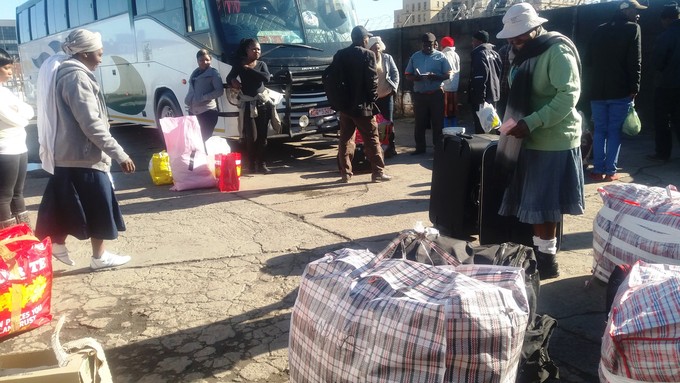Uncertainty over Zimbabwean import ban
Many rely on South Africa’s cheaper groceries and goods
On 17 June, the Zimbabwean government implemented Statutory Instrument 64 of 2016 which restricts Zimbabweans from importing goods from South Africa. There has been confusion ever since, and there were riots earlier this month on both sides of the Beitbridge border. According to media reports, South African business owners were also involved in the protests.
Restricted goods include coffee creamers, baked beans, potato chips, mayonnaise, peanut butter, yoghurt, flavoured milk, cereal, ice cream, cheese, bottled water, salad cream, jams, canned fruits and vegetables, pizza bases, dairy juice blends, and cultured milk; also shoe polish, camphor creams, white petroleum jelly, and body creams’ as well as bedrooms and dining room suites among other things.
In a press statement issued by the Ministry of Industry and Commerce on 22 June, Minister Mike Bimha states: ‘The intended purpose is not to ban the importation of those listed products but to regulate them. The importation of the listed products will be authorised upon production of a valid import licence issued by the Minister of Industry and Commerce.’
The Zimbabwean government hopes the regulations will help revive its failing local industries.
‘The Ministry of Industry and Commerce will allow importation of goods which can be produced locally, when local production cannot meet the national demand, in an endeavour to avoid shortages on the local market,’ the statement read.
The Zimbabwe Ministry of Industry and Commerce did not respond to GroundUp’s inquiries, and despite numerous efforts since early last week, GroundUp has been unable to get clarity from the Zimbabwe Revenue Authority (ZIMRA) on how the regulations are being applied.
However, a source in ZIMRA claimed people with groceries and goods for private use are no longer facing difficulties. ZIMRA is only targeting people importing goods for commercial (as opposed to personal) use.
Small scale traders living from hand to mouth are sure to be negatively affected by the new rules.
An employee from the Ministry of Industry and Commerce in Harare told GroundUp that an import licence is required for the listed goods. The license fee ranged from 30 to 60 US dollars and was valid for one month. People must apply at the Ministry’s offices.
Returning Zimbabweans
On Friday, GroundUp was present as a group of Zimbabweans loaded goods in a trailer of a bus heading for Zimbabwe, including a bedroom suite and electric stoves.
The driver of the bus said, “After the Beitbridge protests on 2 July, people are being allowed to import goods again.”
Kudzai*, 64, who is currently visiting her children in Cape Town, is worried she might not be able to take groceries back to Harare when she returns home because of the new import rules.
Kudzai said she used to be a cross border trader, but stopped trading in 2004 after she suffered a stroke. She started informal trading in South Africa in 1981. She used to sell seat covers, doilies, pottery and traditional clothing.
“I used to sell in Kagiso and Alexandra in Johannesburg. When done selling we would buy groceries for our families, [as well as] blankets and TV sets for resale in Zimbabwe. That is how I managed to send my children to school,” she said.
“This new restriction of goods coming from South Africa is confusing. Cross border trading has always been there and had never been a threat to the Zimbabwean economy. Even during [Ian] Smith regime, women were trading here in SA through clubs. Government should find other ways of reviving the economy without making life more difficult for poor people.”
Kudzai says groceries are available in Zimbabwean supermarkets, but they are more expensive. She is worried about taking home goods for her own use. “Now I want to go back home, but how do I go back empty handed? How am I going to survive?”
*Name has been changed.
Support independent journalism
Donate using Payfast

Don't miss out on the latest news
We respect your privacy, and promise we won't spam you.
Next: No effort by municipality to fix leaking water and sewage
Previous: Families stuck in shacks because of government squabble
© 2016 GroundUp. 
This article is licensed under a Creative Commons Attribution-NoDerivatives 4.0 International License.
You may republish this article, so long as you credit the authors and GroundUp, and do not change the text. Please include a link back to the original article.

